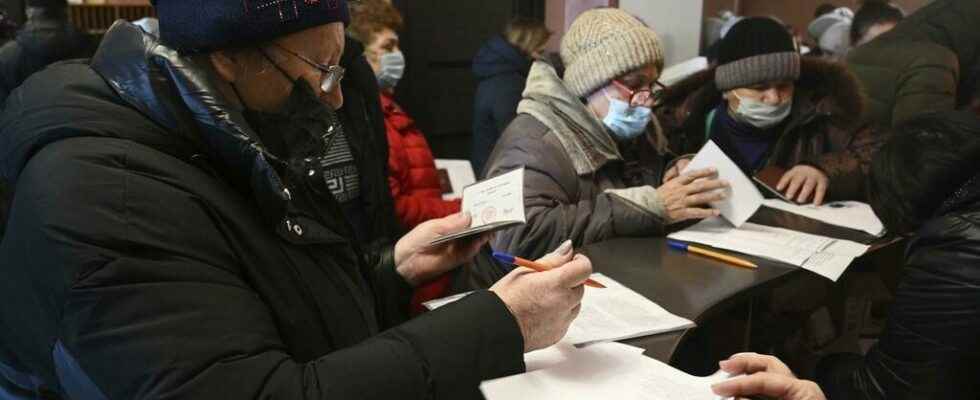Tensions continue to escalate in eastern Ukraine, as diplomacy once again got under way this weekend between Washington and Kiev, Paris and Moscow, to avoid the catastrophic scenario of a general Russian invasion of Ukraine. An appointment has been made for February 24.
Finally, the intense negotiations and steps taken over the past two days, in particular by the French president, seem to leave a glimmer of hope for peace.
► Read also : talks between Emmanuel Macron, Vladimir Putin and Volodymyr Zelensky
Russia and the United States have accepted the idea of a summit proposed by Emmanuel Macron. No date has been given, but the White House has pledged to participate in such a meeting on the condition that Russia does not invade Ukraine. The Russian and American foreign ministers should meet on February 24, next Thursday, to prepare for this summit, no details of which have leaked out.
This meeting seems to be the last chance and will finally allow Vladimir Putin and Joe Biden to directly discuss the differences that oppose them at the borders of Europe with Russia. We do not know if other actors in this crisis, Ukraine, but also the countries of the European Union will participate.
The United States, for their part, continue to speak of an imminent Russian operation to invade Ukraine, while the bombings there seem to be increasing. And Washington has warned the UN of the existence, according to the Americans, of a blacklist drawn up by Moscow of Ukrainians to be eliminated in the event of an invasion. An official letter consulted on Sunday by AFP.
This summit on Thursday therefore seems to be the last opportunity for the various parties to put an end to this Ukrainian crisis.
As usual, these new discussions are the direct consequence of the theatrical heat wave of the past few days (20 heated points of contact, false Ukrainian provocations, staged evacuation of civilians…). At the population level,
— Paul Gogo (@Paugog) February 21, 2022
On the ground, a conflict that has changed
Severodonetsk, where our correspondent is, is not far from the line of contact. This Donbass war, which he has been covering for eight years, has completely changed in recent hours, reports Stephane Siohan.
When I visited eastern Ukraine in recent months, the situation was certainly tense, there was residual mortar fire, but it was more of a war of attrition, with automatic weapons, small explosive charges, says our special correspondent, 80% of Ukrainian military losses were the result of sniper fire.
Since Thursday, it has nothing to do, in the towns of the front line where I visited, in the Lugansk region, whether it is Shchastya or Zolote, now it is the guns that have regained the upper hand . It shoots with heavy weapons, calibers of 122 or 152 millimeters, and the populations had somewhat lost the habit of these explosions. At the moment, there are no civilian casualties on the Ukrainian side yet, but the great anxiety is that the Russian-backed separatists will start using even more destructive weapons in the days to come, if ever the pro-Russians came to increase their pressure.
The Ukrainian army has very clear instructions of restraint in terms of engagement, the military doctrine is clear: if the lives of Ukrainian soldiers are threatened, their officers authorize them to open fire in return.
Now, there is a scenario that everyone fears: if the Russian Federation were to officially recognize the Republics of Donetsk and Lugansk, these could be tempted, as stipulated in their Constitutions, to widen their perimeter on the territory of Donbass controlled by Ukraine. And in that case, the Donbass war would run the risk of spiraling out of control.
A change in the agenda of the Russian Parliament which worries
“It is quite obvious that the majority of Russians support the inhabitants of Donbass and hope that the situation there will change radically for the better”, declared Vladimir Putin, in the company of Olaf Scholz, on February 15, responding to a question on the Duma’s call to recognize the Republics of Donetsk and Lugansk. And the Russian president immediately specified that Russia had to do everything to resolve the situation within the framework of the Minsk agreements.
But last Friday, a change in the agendas of the two chambers of the Russian Parliament, the Duma and the Federation Council, raised concerns, reports our correspondent in Moscow, Jean-Didier Revoin. Officially, it is a question of deciding on the indexation of 8.6% of the pensions of retired soldiers, but this change of program recalls the procedure which led to the recognition by Russia of South Ossetia in 2008, practically immediately after the end of the fights with Georgia.
A recognition of the self-proclaimed republics would mean the death of the Minsk agreements. Agreements that both Moscow and Kiev have pledged to implement in their discussions with Emmanuel Macron this weekend. However, as it stands, it is hard to see the chambers going against the policy pursued by Vladimir Putin.
